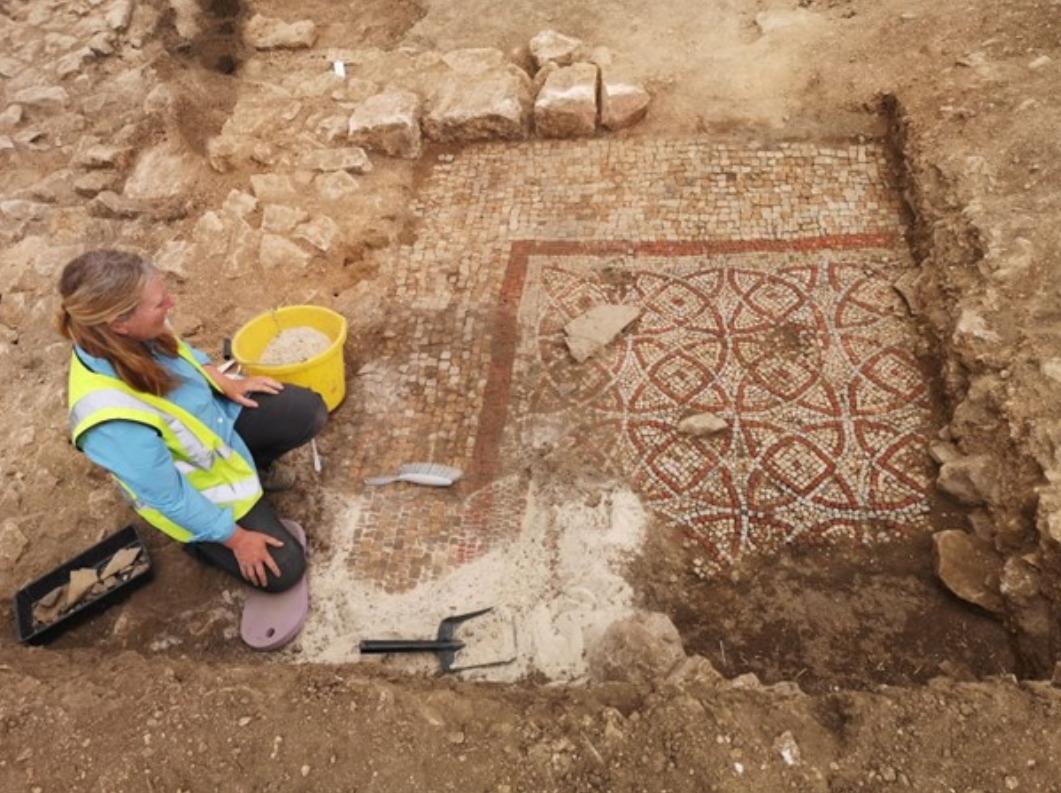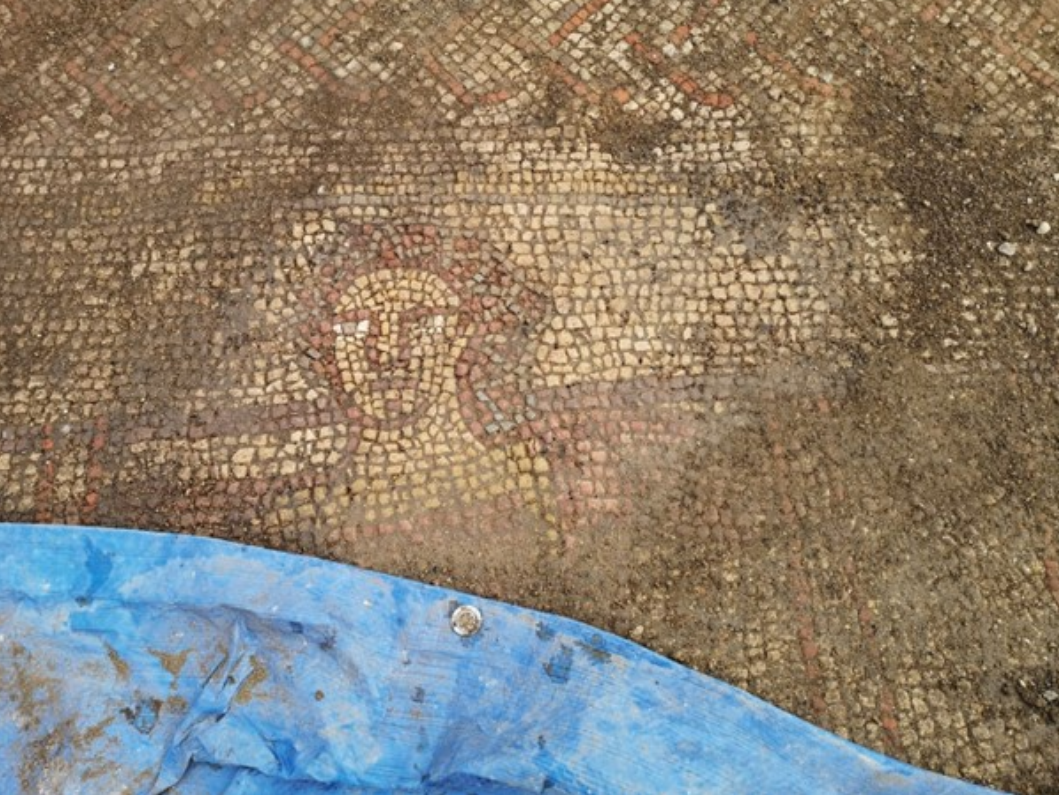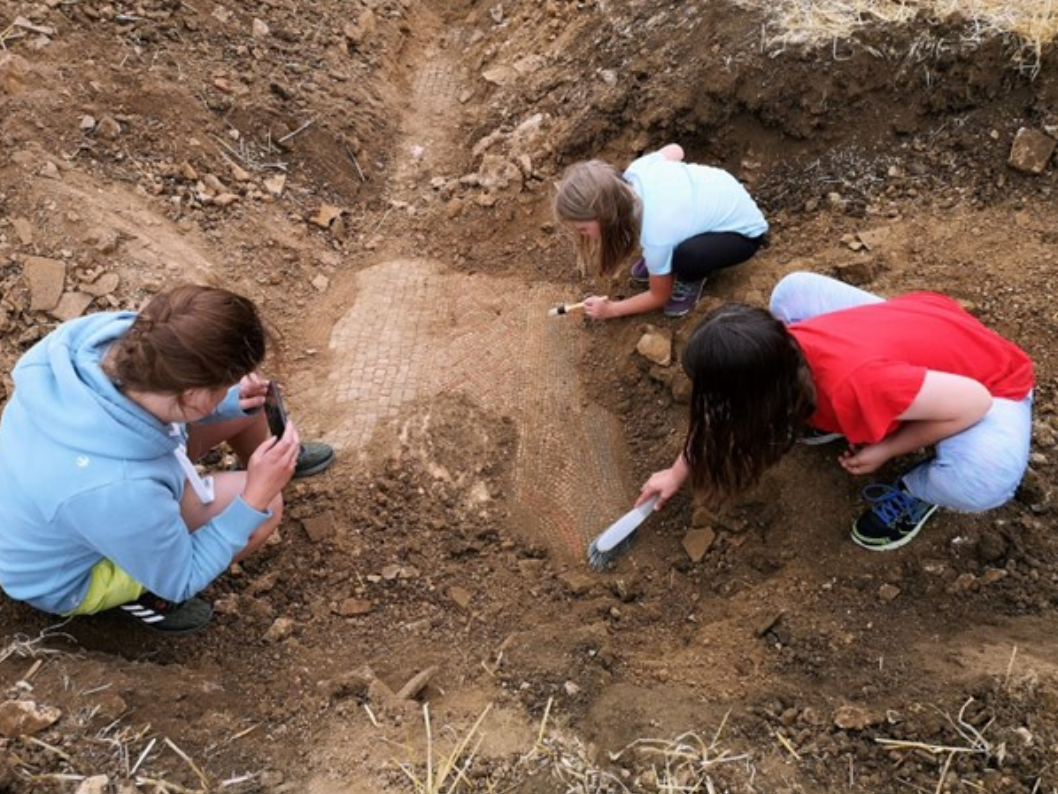What did I do in Lockdown? Found a Roman mosaic!
The mosaic starts to become clear...
There are a hundred different ways and reasons to get excited about the ancient world, and not all of them are typical or straightforward. Sometimes, fascination with antiquity happens entirely by accident, with a twist of fate. With that in mind, let me introduce you to Jim Irvine.
Working Classicists are all about people who come to love Classics in weird and wonderful non-traditional ways. With that in mind, why don’t you tell me what you got up to during the Covid lockdown?
Just like everyone else in lockdown, cabin fever formed a large part of our personalities during the tricky times, so we managed to reduce the effects of this somewhat by getting to the great outdoors and larking about (in this instance, heading for a river in one of my Dad’s fields). During the excursion, and thanks to some conspiring and coincidental conditions (weather, bees and covid), we ended up stumbling across some pottery finds near to the river. Over the rest of the summer, I undertook many hours of investigation to try and figure out why these finds might have been in the field. It was a genuine mystery, and having been in and out of the field over the last thirty years, I was surprised that I’d not noticed anything in the past. My work revealed some conspicuous crop marks which I later investigated with a spade, and the rest, as they say, is history.
So you find a mosaic in a field, what was your knee-jerk reaction, and what happened next?
At the end of the afternoon of digging we’d excavated a trench that measured about twenty feet by eight feet, at around two feet deep, revealing some spectacular images and patterns.
A level of understated, reserved, quiet British shock was hanging in the air for the rest of the weekend.
On Monday morning I called Helen Wells, the HRO, sent over a summary of our antics in pictures, and gently talked her through it. The next day, the experts arrived. We were completely stunned.
What does the mosaic depict?
There are 3 main panels, each showing a scene from Homer’s Iliad. The panels show in 3 steps the battle between Hector and Achilles, and the subsequent recovery of (spoiler alert!) Hector’s body by his father, Priam, in exchange for gold. The panels have some really neat features that show movement and dynamism, as well as being created in such a way that makes the subjects ‘pop out’ of the frames that bound the panels. They really are well thought out, and are essentially three works of art.
A face from the past
Did you have any inkling about how significant this particular mosaic would be?
I’d not really looked closely at other mosaics before, and for that matter, hadn’t really had much exposure to mosaics in general. This was my first, so whilst it was pretty impressive (not least because of its age), I didn’t really have a point of reference. I was fortunate to meet and work with David Neal over the last few years who’s the literal expert on British mosaics, and he seemed suitably impressed and interested, so I took this as a good thing. I’ve subsequently been to visit some other British mosaics, and now it’s clear how special the Rutland Roman Villa mosaic really is.
Tell me what it’s like to have archaeologists move in for a summer or two…
I have really enjoyed working with the archaeologists; I love meeting new people, especially those from other walks of life so my experience of helping them out, organising logistics and generally interacting has been fantastic. I’ve made lots of new friends and we still meet up periodically which is great! We’ve managed to coordinate the digs over the last few years pretty well with the farming activities, and my day job, so it’s not been too much of a disruption.
During the excavations, you got to get your hands dirty alongside the archaeologists. How steep was the learning curve, and what was your favourite aspect of becoming a bona fide archaeologist?
Getting involved with the excavation was a real thrill. Learning proper digging techniques and methods of recording along the way has been very valuable, and it’s important for me to feel useful, so this has been very rewarding.
I’ve also now got my own little trowel, which I’m very proud of, and always keep handy!
Eagle eyed readers may have seen you and the villa on TV; what’s it like having cameras around, and can you still pop out for a pint of milk without getting papped?
This part of the last couple of years has been lots of fun. It’s really interesting to get behind the scenes of a TV show in the making. Everyone was very professional, but also made it fun and engaging. Once you relax in front of the camera, things are much easier, and go much more smoothly! In terms of my fame, I can’t say that I have to worry about getting mobbed by fans in the street… In fact the only people who recognise me are archaeologists! Even whilst I was working alongside the volunteers and students on the dig itself, most of them hadn’t seen the TV show, so didn’t have a clue that this was all my fault!
Scraping and sweeping
The mosaic has obviously garnered a lot of attention, but help me put it into context: What else did you find in the field?
The site is extensive, with buildings and features in the terrain that hint at a fairly large establishment. We can see this in the geophysical survey results which were impressive, largely because of the soil conditions and the buildings mostly having stone foundations. The results showed a number of structures (eight or nine large buildings) that may or may not have been contemporary, and the best assumption at the moment is that it’s a working farmstead. A good parallel might be a Victorian farm/estate with stables, outbuildings and a large flashy house at the centre.
Were there any small objects that really caught your imagination?
Yes, I love the human side of history (as well as the architectural and artistic), and my favourite find was a pair of dividers that might have been used by an architect or engineer (just like me!) to mark out buildings, mosaic floors or even for measuring pots being made on a wheel. The owner left them behind or lost them, which would have been infuriating as they are a fantastic looking functional pair that’s a critical tool in engineering, even today.
Apart from the discovery itself, what was the most surprising part of this whole process?
I’ve been most surprised at the amount of interest that people still have in the mosaic. I’ve been doing about one talk per month to local groups over the last couple of years. I’m trying my hardest to get as many people as possible interested in local archaeology, as I believe there’s a lot we still have to learn.
Before this amazing discovery, did you have much interest in the Ancient Mediterranean?
No, none whatsoever (I mean, I’ve seen the Troy film with Brad Pitt in, if that counts).
Did you ever get to study the ancient world in school? Any memories that stick out?
I mostly dodged history at school, as at the time, I didn’t see the personal relevance. More fool me.
Now that you’ve found the mosaic and worked with so many wonderful experts, has this inspired you to get more involved in the ancient world?
It certainly has; I have plans to visit more sites around the UK, and eventually in Europe. Pompeii is high up the list.
What’s next for the villa?
There are no plans for the villa at the moment; it’s a scheduled ancient monument (which is a pretty big deal) so is legally protected and any future excavations will need special permission and to be planned well. There has been talk of exhibitions at the local museum, but I’ve not heard much about that recently. The closest people can really get to it is from the articles, interviews and talks that I give. Not quite as good as the real thing!
We're gonna need a bigger trowel...
Will you be dressing as Indiana Jones for Hallowe’en?
I dress like Indiana Jones most of the time anyway, but don’t normally carry the whip.
Have you been inspired to read the Iliad yet?
I know I should, and one day I will. I’ll have to go somewhere on holiday where I will have a chance to read. My daily (working) life is not conducive to spending a lot of time reading, which is a real shame.
Real archaeology has featured in quite a few movies recently (The Lost King, The Dig, The Lost City of Z…) Who are you casting to play you in the inevitable biopic?
If I’m personally not available (Producers, ask me first!), and as Richard Burton is no longer with us, I’d probably pick Tom Hiddleston or some other current forty-something British actor. (One of the Archaeology students - who I think must have forgotten her glasses - said I looked like Tom Hardy, so he ought to be on the casting list too!)





